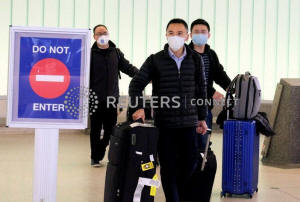Trump administration seeks $2.5 billion in funds to fight coronavirus
 Send a link to a friend
Send a link to a friend
 [February 25, 2020]
By Jeff Mason and Susan Heavey [February 25, 2020]
By Jeff Mason and Susan Heavey
WASHINGTON (Reuters) - The Trump
administration is asking Congress for $2.5 billion to fight the
fast-spreading coronavirus, including more than $1 billion for vaccines,
the White House said on Monday.
With financial markets falling on concerns that the virus will have a
significant impact on the global economy, the Trump administration is
eager to show it is prepared to combat the virus despite the limited
number of cases so far in the United States.
The virus has spread to some 29 countries and territories beyond
mainland China, with outbreaks in South Korea, Iran and Italy.
[L3N2AO07M]
"The Trump administration continues to take the spread of the COVID-19
Coronavirus Disease very seriously. Today, the administration is
transmitting to Congress a $2.5 billion supplemental funding plan to
accelerate vaccine development, support preparedness and response
activities and to procure much needed equipment and supplies," said
Rachel Semmel, a spokeswoman for the White House Office of Management
and Budget.
The money will be used for therapeutics, vaccine development and the
stockpiling of personal protective equipment such as masks, the White
House said.

Of the $2.5 billion request, $1.5 billion represents new funding. The
rest would come from funds already budgeted by Congress, such as unused
money to fight the Ebola virus. The administration requires
congressional approval to redirect that money to fight the coronavirus.
House of Representatives Appropriations Committee Chairwoman Nita Lowey,
a Democrat, said in a statement the Trump administration's funding
request was "woefully insufficient to protect Americans from the deadly
coronavirus outbreak."
House Speaker Nancy Pelosi said late on Monday that the supplemental
funding requested by Trump is "undersized" and "completely inadequate to
the scale of this emergency".
"The House will swiftly advance a strong, strategic funding package that
fully addresses the scale and seriousness of this public health crisis,"
Pelosi said in a statement.
The United States has not seen the virus spread through its communities
the way that China and other countries have experienced, but health
officials are preparing for the possibility even as Americans affected
so far have been quarantined.
[to top of second column]
|

Passengers arrive at LAX from Shanghai, China, after a positive case
of the coronavirus was announced in the Orange County suburb of Los
Angeles, California, U.S., January 26, 2020. REUTERS/Ringo Chiu/File
Photo

There have been 53 confirmed U.S. cases of the new coronavirus so far -
14 in people diagnosed in the United States and 39 among Americans
repatriated from the outbreak's epicenter of Wuhan, China, and from the
Diamond Princess cruise ship quarantined in Japan, according to the U.S.
Centers for Disease Control and Prevention.
TRAVEL WARNING
U.S. health officials have warned that cases among repatriated
citizens will likely increase.
The CDC warned Americans on Monday to avoid travel to South Korea
because of the virus.
"We have aggressively worked to combat the spread of this virus,
tried to prevent it as best we could from coming into this country,"
White House spokesman Hogan Gidley told reporters earlier on Monday.
Trump has been at odds with his own White House advisers over
China's coronavirus response. He has sought to downplay the impact
of the virus, saying it could fade in April with warmer weather -
something health experts said is unknown.
Trump has praised the work of Chinese President Xi Jinping, even as
his advisers have questioned the reliability of the information
Beijing has shared on the virus and expressed frustration over its
reluctance to accept U.S. expertise in combating it.
The Trump administration is also grappling with where to send
Americans evacuated from the Diamond Princess who tested positive
for the virus after backing off plans to quarantine them in a
federal facility in Alabama.
In a statement on Monday, HHS cited a "rapidly evolving situation,"
but said the Alabama center was "not needed at this time" and that
it was looking for alternatives.

(Reporting by Jeff Mason and Susan Heavey; Additional reporting by
Caroline Humer in New York, Manas Mishra and Kanishka Singh in
Bengaluru and Makini Brice, Ted Hesson and Eric Beech in Washington;
Editing by Peter Cooney)
[© 2020 Thomson Reuters. All rights
reserved.] Copyright 2020 Reuters. All rights reserved. This material may not be published,
broadcast, rewritten or redistributed.
Thompson Reuters is solely responsible for this content. |